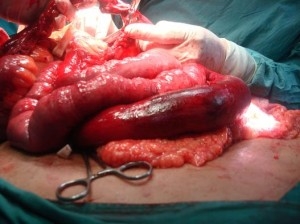Intestinal Ischemia Symptoms, Causes, Diagnosis and Treatment

What Is Intestinal Ischemia?
The condition occurs when arteries leading towards the intestines get blocked or narrowed, decreasing the blood flow. Moreover, intestinal ischemia tends to affect the large intestine, small intestine or can affect the both. Reduced blood flow root pain, whilst can damage the intestine permanently.
In addition to this, sudden blood flow loss to your intestine is a medical emergency which needs prompt surgery. However, intestinal ischemia which progresses in due course needs treatment as it can turn acute, or cause malnutrition and considerable weight loss.
What Are The Symptoms Of Intestinal Ischemia?
Its symptoms can develop gradually, say chronic or suddenly- acute.
- Acute intestinal ischemia: fever, vomiting or nausea, blood in stool, swelling or tenderness in abdomen, forceful and frequent bowel movements, urgent urge for bowel movement, sudden pain in abdomen.
- Chronic intestinal ischemia: bloating, vomiting or nausea, diarrhea, weight loss, fear to eat due to subsequent pain, abdominal pain which turn worse over months, abdominal fullness or cramps that starts within twenty five minutes after consuming meals and last for 1-3 hours.
What Causes Intestinal Ischemia?
The condition occurs when the flow of blood to the intestines is blocked or slowed. Because of this, cells in the digestive system become deficient for oxygen, which results into their expiry and weakness, damaging the intestines.
What Are The Risk Factors Of Intestinal Ischemia?
Certain factors can increase the chances of intestinal ischemia such as:
- Atherosclerosis.
- High or low blood pressure.
- Heart problems for example irregular heartbeat or congestive heart failure.
- Illegal drug consumption such as methamphetamine and cocaine.
- Blood-clotting concerns.
- Medications for example birth control medicines which leads the blood vessels to contract or expand.
What Are The Potential Complications Of Intestinal Ischemia?
Few complications associated with intestinal ischemia are:
- Death of the tissues of intestines.
- Narrowing of your colon.
How Is Intestinal Ischemia Diagnosed?
In case of observing the above mentioned symptoms of acute or chronic intestinal ischemia, you must immediately ask for your doctor’s appointment. He or she can diagnose intestinal ischemia on the basis of symptoms; however the doctor can also suggest the following imaging tests in order to ascertain its intestinal ischemia:
- MR or CT angiography.
- Arteriography.
Few other procedures your doctor may suggest include
- Colonoscopy.
- Endoscopy.
- Exploratory surgery.
How Is Intestinal Ischemia Treated?
The treatment of the condition tends to aim restoring the blood flow needed by the digestive tract for normal functioning. Its treatment options differ, depending upon the severity and type of intestinal ischemia.
Prevention:
Certain changes in lifestyle can greatly help minimizing the chances to develop intestinal ischemia. Such as:
- Consume a diet ample in whole grains, vegetables and fruits.
- Do not smoke, if you do, quit smoking.
- Minimize the consumption of fat, cholesterol and added sugar.
- Exercise daily for at least 25 minutes a day.
- Healthy weight gain is important.
- Control other concerns related to your health, which invites or progresses into serious complications in the long run.
By : Natural Health News




